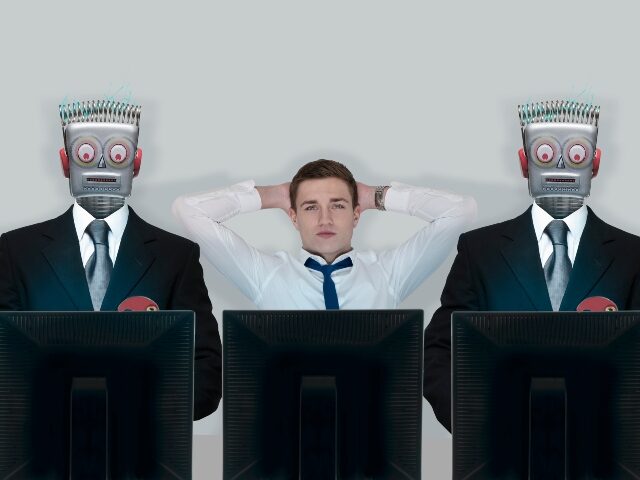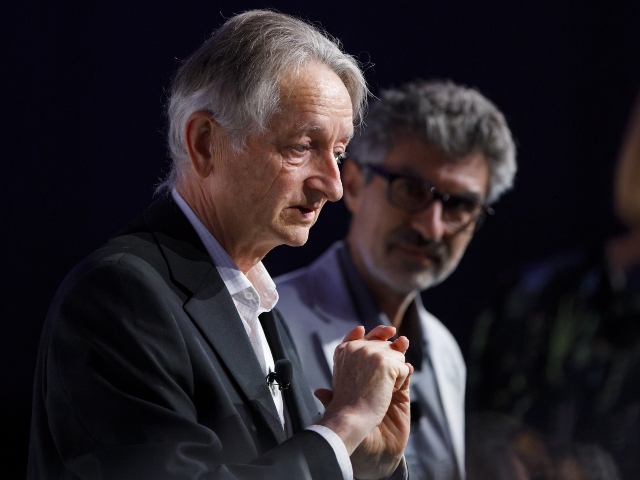'Godfather of AI' Calls for Universal Basic Income to Counter Job Losses
 Andrew Bret Wallis/Getty
Andrew Bret Wallis/Getty
Geoffrey Hinton, a tech pioneer nicked the “Godfather of AI,” has urged governments to implement a universal basic income (UBI) to mitigate the devastating impact of AI on jobs.
The Daily Mail reports that in a recent interview with the BBC’s Newsnight, Geoffrey Hinton, a former Google VP and a pioneer in the field of AI, expressed his concerns about the potential negative consequences of AI and robots on society. He warned that millions of workers could be left jobless due to the technology, while the wealth resulting from the increased productivity would not be evenly distributed.

Geoffrey Hinton, chief scientific adviser at the Vector Institute, speaks during The International Economic Forum of the Americas (IEFA) Toronto Global Forum in Toronto, Ontario, Canada, on Thursday, Sept. 5, 2019. The Toronto Global Forum is a non-profit organization fostering dialogue on national and global issues that brings together heads of states, central bank governors, ministers and global economic decision makers. Photographer: Cole Burston/Bloomberg
“I certainly believe in a universal basic income,” Hinton stated. “But I don’t think that’s enough because a lot of people get their self-respect from the jobs they do.” He emphasized the need for additional measures to address this issue, highlighting the importance of ensuring that people maintain a sense of purpose and dignity in the face of widespread job losses.
Hinton, who recently quit Google to sound the alarm about AI, said he was pleased that the world was now taking its ‘existential threat’ to humanity seriously, as well as its impact on society. “I am very worried about AI taking over lots of mundane jobs,” he said. “That should be a good thing. It’s going to lead to a big increase in productivity, which leads to a big increase in wealth, and if that wealth was equally distributed that would be great, but it’s not going to be.”
Hinton’s warning comes amidst growing concerns about the impact of AI on the job market. The International Monetary Fund predicts that 40 percent of jobs worldwide will be affected by AI, while the Institute for Public Policy Research estimates that eight million jobs in the UK could be lost due to the introduction of AI in the workplace.
Despite the potential benefits of increased productivity and wealth creation, Hinton cautioned that the current economic systems would likely result in the concentration of wealth among the rich, rather than benefiting those whose jobs are displaced by AI. “In the systems we live in, that wealth is going to go to the rich and not to the people whose jobs get lost, and that’s going to be very bad for society, I believe,” he said. “It’s going to increase the gap between rich and poor, which increases the chances of Right-wing populists getting elected,” he warned.
Hinton also predicted that while many blue-collar and ‘mid-level intellectual jobs’ will disappear because of AI, some jobs, such as plumbing, could be safe from the march of the robots. “My best bet about a job that is safe is plumbing, because these things [AI] aren’t yet very good at physical manipulation,” he said. “That will probably be the last thing they are very good at.”
Hinton’s comments come at a time when businesses are increasingly adopting AI technologies. For example, UK supermarket chain Sainsbury’s recently signed a deal with Microsoft to use the tech giant’s AI tools to enhance the shopping experience for customers and help staff save time on key tasks. Additionally, UK Prime Minister Rishi Sunak is set to co-host a virtual session of world leaders and tech bosses with President Yoon Suk Yeol of Korea, where he is expected to emphasize the importance of working together to ensure the safe development and deployment of AI.
Read more at the Daily Mail here.
Lucas Nolan is a reporter for Breitbart News covering issues of free speech and online censorship.
Source link

